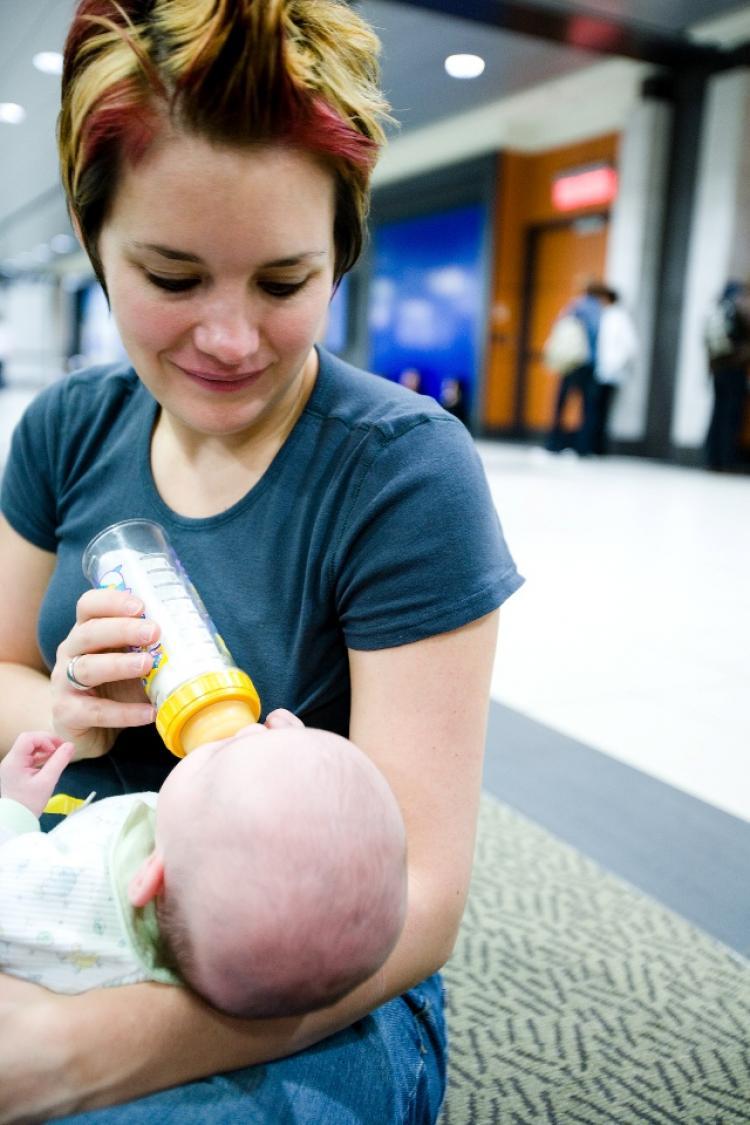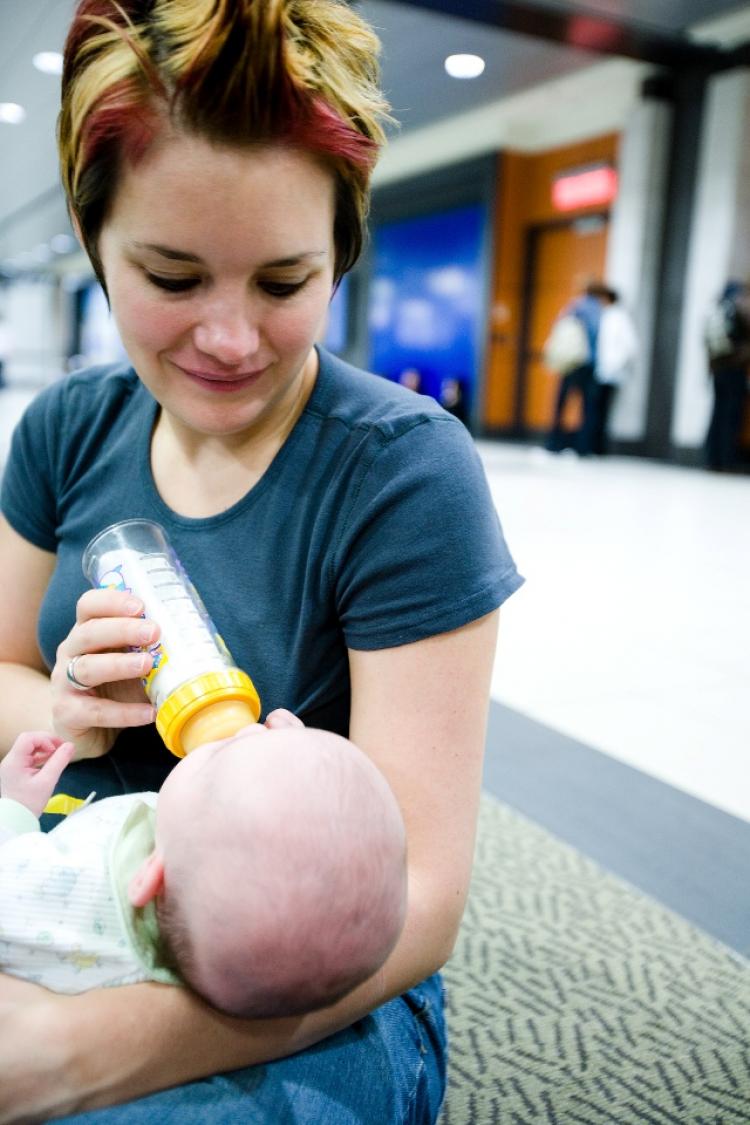Known for its lighthouses and rugged coastlines, Yarmouth, Nova Scotia is becoming recognized for something else — the town of 7,500 has more than twice the provincial average of teen pregnancies.
The teen pregnancy rate in Yarmouth has been the highest in the province for some time. A Dalhousie University study in 2001 estimated that one in four girls will experience a pregnancy at some point between the ages of 15 and 19.
Local professionals say substance abuse, broken homes and the “welfare mentality” are all factors in why so many of Yarmouth’s young girls are ending up pregnant.
Pam Churchill, executive director at the Tri-County Pregnancy Care Centre, adds bad parenting to that list. Judging from the feedback she’s getting from her clients, parents are not providing the structure and boundaries young girls need, says Churchill.
“There seems to be no parental guidance in their life. In some cases the parents are even saying it’s okay to do this.”
Churchill says she hears comments like, “Why does my mom allow my boyfriend to sleep over in the same room with me” and, “I wish my parents were stricter.”
“We all know that as teenagers you don’t like your parents telling you what to do, yet I’m finding when that’s not there they don’t like that either because it makes them feel like they’re not cared about.”
Some girls who show up at the pregnancy crisis centre, which assisted close to 400 last year, are actually hoping that they are pregnant. Churchill believes this is because they’re “feeling unloved” and see the baby as someone who will love them unconditionally.
Local junior high school teacher Joe Bishara learns a lot about his students’ home life through an anonymous suggestion box he keeps in his Personal Development and Relationships class. He also runs a Friday night support group for students.
A teacher for over 30 years, Bishara says in his observation many who grew up in the 1980s are proving to be today’s “immature parents” who aren’t giving their children enough love and support.
Kids as young as 13 talk about feeling alone and being ignored by their parents. Girls with absent fathers have the most problems, he says, and those who are not getting love and affection at home tend to look for it elsewhere.
“They’re looking for father figures…. They’re so wounded.”
Bishara also says some parents pressure their daughters to get pregnant; he’s had girls in his junior high class tell him, “Mom wants me to get pregnant, she wants to be a grandmother.”
Michelle Archibald-Hattie, executive director of the Yarmouth Centre for Sexual Health, says she’s aware of a number of grandparents who are younger than 35.
“Mom was a parent at 15 and now her 15-year-old daughter is pregnant.”
Archibald-Hattie says Yarmouth needs more for youth to do and a place where they can go to hang out. She also says more should be done to educate boys of the consequences of being sexually active — something the Centre for Sexual Health is endeavouring to do.
“They need to realize that when they have sex they can get a girl pregnant and when they get that girl pregnant they’re just as involved in the pregnancy as she is.”
Yarmouth resident Sarah Durkee-Baird defies the generalizations about teen moms. She came from a stable home with caring parents, yet she got pregnant when she was 16.
“I was honestly just bored,” she says. “It’s not that I wasn’t educated. I knew it was a possibility but I guess I just assumed it would never happen to me.”
This is classic thinking for many teens who are sexually active, almost half of whom never consider how a pregnancy would affect their lives, according to the National Campaign to Prevent Teen and Unplanned Pregnancy in Washington D.C.
While the teen pregnancy rate has dropped in both Canada and the U.S. over the past 15 years, it’s still far higher in America than in other industrialized countries. Three out of 10 girls in the U.S. get pregnant before the age of 20, says the National Campaign.
The social consequences of children having children are far-reaching says Jessica Sheets, spokesperson for the National Campaign.
“Education is obviously a huge issue. It’s difficult for a single mom to finish high school and therefore it is less likely her children will attend or complete high school themselves.”
The male children of teen moms frequently end up incarcerated, says Sheets, while their daughters typically become teen mothers themselves. Children born to teen parents are also more likely to be placed in foster care than those born to older women.
“The cost to taxpayers is staggering. It’s about $9.1 billion and that’s a conservative estimate based on a research study we did in 2006.”
Churchill says most Yarmouth teenagers opt to keep the baby rather than have an abortion or choose adoption. The same is true in the U.S., says Sheets.
As for negligent parents, Sheets says it’s becoming increasingly obvious that many parents have a “head in the sand” mentality and are not explaining to their teens the consequences of having a baby at such a young age.
“Parents don’t want to have these conversations because they’re hard, they’re embarrassing, it’s difficult to bring this stuff up with your kid. It’s sort of like, ‘Well, they seem like they’re doing okay so why rock the boat,’ and that’s a big problem.”
Research shows that babies born to younger mothers are also more likely to have health problems.
Compared with babies of older mothers, those born to teenagers tend to have lower birth weights, increased infant mortality, and an increased risk of hospital admission in early childhood, according to a paper by Don Langille, professor of Community Health and Epidemiology at Dalhousie University.
Langille, who’s currently conducting research on the high teen pregnancy rate in Yarmouth, urged doctors to take more of an interest in teenagers’ sexual health history, citing studies which have shown that by the time they finish high school, the majority of teenagers have had sexual intercourse—about 10 percent before the age of 15.
Many blame the glamorization of teen pregnancy in movies and the appeal of “celebrity pregnancy” as a factor in why teenagers want to get pregnant.
Statistics also show that teen parents often end up in a cycle of poverty that can be extremely difficult to escape from.
“I see too many brilliant young women who have given up everything, and through the circumstances of their life, they’re now anchored to a corner of Yarmouth and they’re not going to be the brilliant young person they could have been,” says Bishara.
Durkee-Baird, whose daughter is now 10, has managed to escape that fate.
After dropping out for a year, with the support of her family she went to an adult high school and then to college, all the while holding down an evening job. She’s now married and working as an administrative assistant at a college.
“My family gave me amazing support so that when I moved out on my own I more or less knew how to do it. But I was lucky; not every young lady has the support that I did.”
The Epoch Times publishes in 35 countries and in 19 languages. Subscribe to our e-newsletter.







